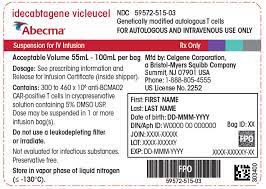Abecma
Genric Name: Idecabtagene Vicleucel
Dosage Form: suspension form for intravenous infusion
What is Abecma?

Abecma is used to treat patients suffering from multiple myeloma who have tried at least four types of treatment regimens that haven’t resulted in any improvement or have stopped working.
Abecma is a drug created by the white blood cells of your body. the cells are genetically altered to identify and attack your multiple myeloma cells.
Important information
Abecma may trigger negative side effects that could be dangerous and could result in death. Contact your doctor or seek medical assistance immediately if you notice any of these:
- difficulties breathing
- fever (100.4degF/38degC or more)
- chills/shivering
- confusion
- dizziness or lightheadedness
- Twitching or shaking (tremor)
- Heartbeats that are irregular or fast
- severe fatigue
- severe nausea, vomiting, diarrhea
It is crucial to inform your healthcare provider that you’ve received Abecma. Also, be sure to present them with your Patient Wallet Card. Your healthcare provider could give you additional medications to treat your symptoms.¶
How do I use Abecma?
Abecma is a product of those white blood cells that you have. Therefore, the blood you give away will be gathered via a procedure known as “leukapheresis”.
Blood cells from your blood will go to a factory to create your Abecma. Based on the clinical trial experience the process takes approximately 4 weeks after your cells arrive at the manufacturing centre and are ready to be delivered back to your healthcare provider however, the timing may differ.
Before receiving treatment, your physician will prescribe chemotherapy for three days in order to help prepare your body for treatment.
If your treatment is in place your doctor will administer the Abecma to you via the catheter (tube) put in the vein (intravenous infusion). Your dose will be delivered via one or more infusion bags. The infusion usually lasts between 30 and 60 minutes per bag.
Your condition will be closely monitored by the accredited healthcare facility in which you received the treatment for at minimum 7 days following the infusion.
You must plan to stay within two hours of the location for at least four weeks following receiving treatment. Your healthcare professional will review to make sure that your treatment is effective and assist you to deal with any adverse effects that could happen.
What should I be aware of after having received Abecma?
- Avoid driving, operating large machinery or engaging in other things that are hazardous if you’re in a state of mental apathy for at least 8 weeks following the treatment. The reason for this is that the treatment may result in temporary memory and coordination issues insomnia as well as dizziness, confusion, and seizures.
- Don’t give organs, blood, tissues or cells to be transplanted.
Abecma side effects
The most frequent adverse effects include:
- fatigue
- fever (100.4degF/38degC or more)
- chills/shivering
- severe nausea or severe nausea or diarrhea
- less appetite
- headache
- dizziness/lightheadedness
- confusion
- difficulties speaking or speech slurred
- cough
- trouble breathing, chest pain
- rapid or irregular heartbeat
Abecma can trigger a common side effect, referred to as CRS or cytokine release syndrome which is a serious condition or even fatal. CRS symptoms include anxiety, fever and dizziness or lightheadedness. headache, nausea, fast heartbeat or blood pressure that is low, or fatigue. Inform your doctor immediately if you notice symptoms of fever or other signs after receiving treatment.
Abecma could increase the chance of developing life-threatening illnesses that could cause death. Contact your healthcare professional immediately if you notice symptoms of chills, fever or any indications or signs of infection.
Abecma may reduce the number of blood cells (red blood cells white blood cells or platelets) that can make you feel tired or weak or increase the chance of developing a serious infection or bleeding. Following treatment, your doctor will examine your blood to determine this. Inform your healthcare provider immediately if an illness makes you feel exhausted, or have bruises or bleeding.
If you have Abecma in the blood, it can result in a false-positive human immune deficiency virus (HIV) results through certain commercial tests.
This is not the only list of possible adverse negative effects. Contact your doctor to get medical advice on possible side effects. You can report any adverse reactions to the FDA at 1-800-FDA-1088.
What other medications can affect Abecma?
Other medications may interfere with idecabtagene-vicleucel, such as prescription and over-the-counter medications, vitamins, and herbal products. Inform your physician about all the medications you currently use as well as any medications you are about to start or stop taking.
General information on the safe and efficient usage of Abecma
Sometimes, medicines are prescribed for purposes that are not those described in the Medication Guide. If you’d like more details, consult your physician. You could ask your health care provider for any information specifically written for health professionals.
More details
Always consult your doctor to make sure the information presented on this site is appropriate to your specific situation.
